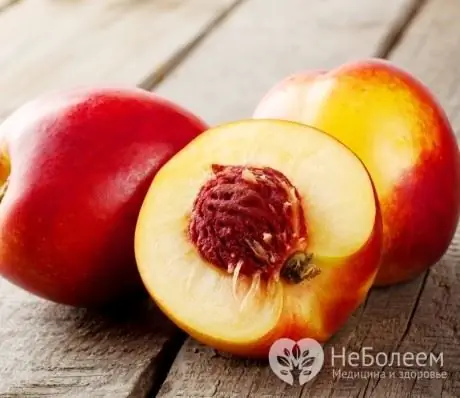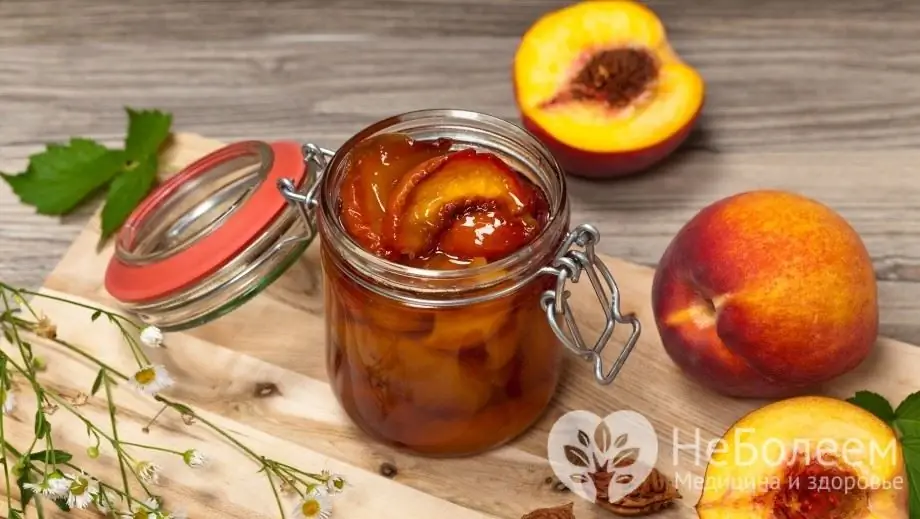- Author Rachel Wainwright wainwright@abchealthonline.com.
- Public 2023-12-15 07:39.
- Last modified 2025-11-02 20:14.
Nectarine
Nectarine is a juicy and sweet fruit that is obtained through peach breeding. These fruits are similar in appearance and taste.
The ratio of BJU in the product

Source: depositphotos.com How to burn 44 kcal?
| Walking | 11 minutes |
| Jogging | 5 minutes. |
| Swimming | 4 minutes |
| A bike | 6 minutes |
| Aerobics | 9 minutes |
| Household chores | 15 minutes. |
Biological features and distribution
The first mention of nectarine dates back to 1616, when these fruits were first grown in East Asia. Currently, nectarines are common in Italy, Greece, Cyprus and Tunisia.
In terms of its biological characteristics and composition, this fruit is similar to a peach. The nectarine fruit is soft and has a smooth skin, pleasant aroma and taste.
The origin of this fruit is associated with a kidney-type mutation, when self-pollination of peach trees occurred and nectarines grew on them. Nowadays, nectarines often grow on peach trees and vice versa.
Nectarine is a winter-hardy variety that is resistant to disease and pests, and adapts well to cold climates. Therefore, this fruit can grow in Russia (in the Caucasus and in the Stavropol Territory).
In Europe, large-fruited nectarines with yellow flesh, which have a high taste, are popular.
Beneficial features
Due to the content of vitamins and microelements in nectarine, the fruit has a number of useful properties. It contains fructose, sucrose, organic acids, glucose, vitamins PP and C, polyphenol, pectin, as well as useful substances such as phosphorus, potassium, magnesium, sodium, sulfur, iron, calcium and silicon.
The use of nectarine improves the functioning of the digestive glands and the digestion of food. The fruit contains antioxidants that are beneficial for cell regeneration, preventing the appearance of wrinkles and maintaining the necessary moisture balance in the tissues. Also, nectarine contains pectin, which stops the effects of harmful microorganisms and prevents the development of cancerous tumors.
It is useful to use nectarine for anemia, increased acidity of the stomach, constipation, and malfunctioning of the cardiovascular system.
With regular use of this fruit, prevention of hypertension and atherosclerosis occurs. The fruit is rich in fiber, carbohydrates and vitamin A.
In some varieties of nectarine, the seeds are sweet and taste like a nut, and in their chemical composition they are similar to almonds. In pharmacology, nectarine seed oil is used for the preparation of various ointments and medicines.
The peel of this fruit is part of activated carbon, and wood is often used to create souvenirs and crafts.
Nectarines contain more potassium, ascorbic acid and provitamins than peaches, but 10% less sugar.
Caloric content of nectarine
Nectarine is a low-calorie fruit that is useful as a main or additional ingredient in a diet.
The calorie content of nectarine is 48 kcal, and it also contains 11 g of carbohydrates, 0.2 g of fat and 0.9 g of protein.
Eating nectarine
Nectarine can be consumed both fresh and baked, used for making jam and ice cream. These fruits are suitable for canning, pickling and drying.
In many European countries, this fruit is often used for making desserts, jams, confitures and compotes. In the Mediterranean countries, nectarines are preserved and used to prepare salads, stews, as well as other vegetable and meat dishes.
These fruits make a good filling for baking, they add a special juiciness and pleasant taste to desserts and cocktails.

Contraindications for nectarines
The seeds of some varieties of nectarines contain hydrocyanic acid, which is a toxic poison. Therefore, they should be excluded from eating.
Contraindications to the use of this fruit are individual intolerance and predisposition to allergic reactions to the proteins contained in the nectarine peel.
YouTube video related to the article:
Found a mistake in the text? Select it and press Ctrl + Enter.






